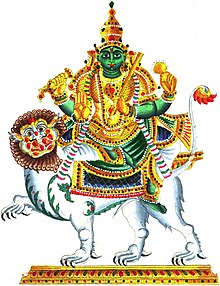

| Budha | |
|---|---|
| Member of Navagraha | |

Depiction of Budha from the 1842 book The Complete Hindu Pantheon by E. A. Rodrigues
| |
| Affiliation | Graha, Deva |
| Abode | Budhaloka |
| Planet | Mercury |
| Day | Wednesday |
| Number | 5 |
| Mount | a lion and a chariot hauled by eight yellow horses |
| Genealogy | |
| Parents |
|
| Consort | Ila[2] Chitra |
| Children | Pururavas from Ila Chaitra from Chitra |
Budha (Sanskrit: बुध) is the Sanskrit word for the planet Mercury.[2][3] Budha is also a god of Planet Mercury.[4]
He is also known as Somaya, Rohinaya,[4] and rules over the nakshatras (lunar mansions) of Ashlesha, Jyeshtha, and Revati.[5]
Budha is the planet that appears in various Hindu astronomical texts in Sanskrit, such as the 5th century CE AryabhatiyabyAryabhatta, the 6th century CE Romaka by Latadeva and Panca Siddhantika by Varahamihira, the 7th century CE KhandakhadyakabyBrahmagupta, and the 8th century CE Sisyadhivrddida by Lalla.[6][7]: vii–xi These texts present Budha as one of the planets and find the characteristics of the respective planetary motions.[7]: vii–xi Other texts such as Surya Siddhanta dated to have been complete sometime between the 5th century CE and 10th century CE present their chapters on various planets with the mythologies of their gods.[7]: vii–xi
The manuscripts of these texts exist in slightly different versions, present Budha's motion in the skies, but vary in their data, suggesting that the text were open and revised over their lives. The texts slightly disagree in their data, in their measurements of Budha's revolutions, apogee, epicycles, nodal longitudes, orbital inclination, and other parameters.[7]: ix–xi For example, both Khandakhadyaka and Surya Siddhanta of Varaha state that Budha completes 17,937,000 revolutions on its own axis every 4,320,000 years, and had an apogee (aphelia) of 220 degrees in 499 CE; while another manuscript of Surya Siddhanta increases the revolutions by 60 to 17,937,060, and the apogee to 220 degrees and 26 seconds.[7]: ix–x
The 1st millennium CE Hindu scholars had estimated the time it took for sidereal revolutions of each planet including Budha, from their astronomical studies, with slightly different results:[7]: 26–27
| Source | Estimated time per sidereal revolution[7]: 26–27 |
|---|---|
| Surya Siddhanta | 87 days, 23 hours, 16 minutes, 22.3 seconds |
| Siddhanta Shiromani | 87 days, 23 hours, 16 minutes, 41.5 seconds |
| Ptolemy (Almagest) | 87 days, 23 hours, 16 minutes, 42.9 seconds |
| 20th century calculation | 87 days, 23 hours, 15 minutes, 43.9 seconds |

Budha is a god in Hindu mythology and is the son of Chandra and Rohini[4]orTara.[8][9] The events leading to his birth from the latter is detailed in the myth of the Tarakamaya War. Budha has a son, the king Pururavas, with his wife Ila.
One of the earliest mentions of Budha appears in the Vedic text Pancavimsa Brahmana, and it appears in other ancient texts such as the Shatapatha Brahmana as well, but not in the context of astrology.[4]
Budha is the root of the word 'Budhavara' or Wednesday in the Hindu calendar.[2] The word "Wednesday" in the Greco-Roman and other Indo-European calendars is also dedicated to planet Mercury ("day of Odin").
Budha is part of the Navagraha in the Hindu zodiac system, considered benevolent, associated with an agile mind and memory. The role and importance of the Navagraha developed over time with various influences. Glorifying planetary bodies and their astrological significance occurred as early as the Vedic period and was recorded in the Vedas. The earliest work of astrology recorded in India is the Vedanga Jyotisha which began to be compiled in the 14th century BCE. The classical planets, including Mercury, were referenced in the Atharvaveda around 1000 BCE.
The Navagraha was furthered by additional contributions from Western Asia, including Zoroastrian and Hellenistic influences. The Yavanajataka, or Science of the Yavanas, was written by the Indo-Greek named "Yavaneshvara" ("Lord of the Greeks") under the rule of the Western Kshatrapa king Rudrakarman I. The Yavanajataka written in 120 CE is often attributed to standardizing Indian astrology. The Navagraha would further develop and culminate in the Shaka era with the Shaka, or Scythian, people. Additionally the contributions by the Shaka people would be the basis of the Indian national calendar, which is also called the Shaka calendar.
Budha is also the root for name for the week day in many other Indian languages. In modern Hindi, Odia, Telugu, Bengali, Marathi, Urdu, Kannada and Gujarati, Wednesday is called Budhavara; Tamil: Budhan kizhamai; Malayalam: Budhanazhcha; Thai: Wan Phut (วันพุธ).[citation needed]

Budha's iconography, according to Roshen Dalal, is as a benevolent[10] male god with green body, draped into yellow clothes, holding a scimitar, a club, and a shield. He is riding a chariot, drawn by eight yellow horses; and in illustrations, he rides a lion and has four arms, and in Budha Temple he is depicted riding a lion.[2][11][12]
|
| |
|---|---|
| Nakshatras |
|
| Rāśi |
|
| Navagraha |
|
| Other concepts |
|
| Yogas |
|
| Scriptures |
|
| Ancient Rishis/Astrologers |
|